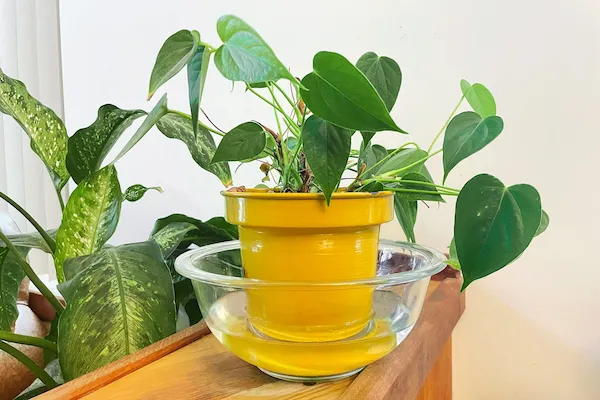
Bottom Watering 101: When and Why to Try It
Bottom Watering 101: When and Why to Try It

Category: The Dirt on Plant Care
Heard people talking about bottom watering but not sure what it means? Don’t worry—it’s not some elite plant hack. It’s actually one of the best ways to water your plants, especially if you're dealing with finicky roots, root rot worries, or soil that’s hard to re-wet.
Let’s break it down 👇
What Is Bottom Watering?
Instead of pouring water on top of the soil, you place your plant pot in a tray or bowl of water and let it soak from the bottom up. The roots pull in exactly what they need—no overwatering, no soggy topsoil.
When to Use It
💧 Your plant is in well-draining soil
🌿 You want to avoid splashing the leaves (great for Calatheas, too!)
🌱 You’re rooting a cutting and want even moisture
🌵 You’ve got compacted soil that won’t absorb top watering
🚫 Your plant is prone to root rot
How to Bottom Water
Fill a tray or bowl with water
Place your pot (with drainage holes!) into the water
Let it sit for 10–30 minutes
Remove the pot and let any excess water drain out
Pro Tip: Use a Clear Nursery Pot to watch the moisture climb up the soil—and stop watering once the top is just barely moist.
The Perfect Pair
🪴 Works best with Signature Grow Mix—it absorbs water evenly without getting soggy
💡 Pair with a watering schedule and occasional top watering to flush salts if you're fertilizing
🌿 Add Root Boost to the water for extra support during root development or propagation
Root Tip
Bottom watering is amazing for succulents, string plants, and anything with delicate roots. Just don’t forget to check the soil’s dryness first—bottom watering still starts with knowing when your plant is thirsty.
Want to give your plant roots a spa day?
Grab a tray, a bag of Signature Grow Mix, your favorite Clear Nursery Pot, and a little Root Boost—you’ll be amazed how happy those roots get.